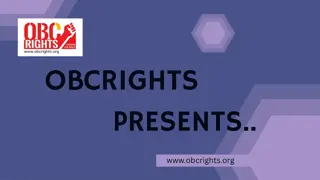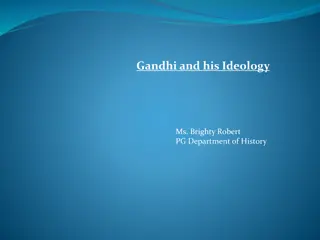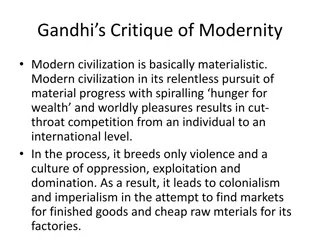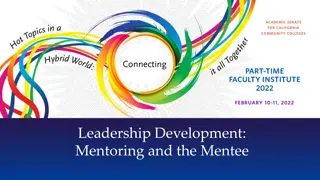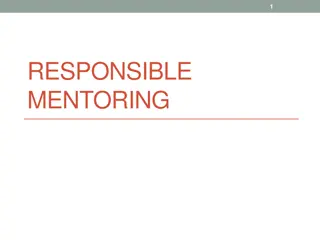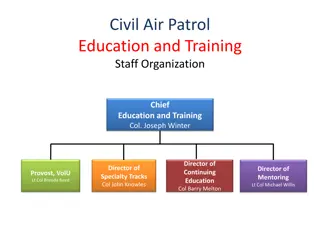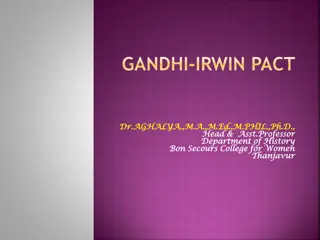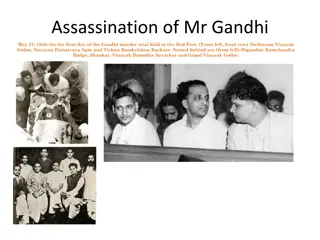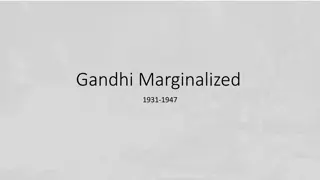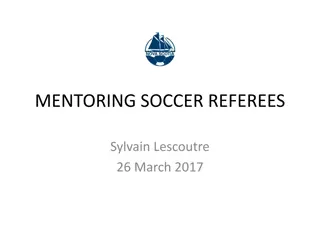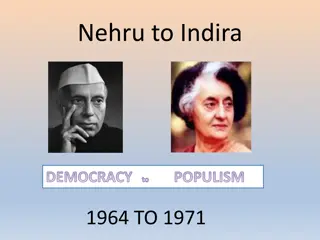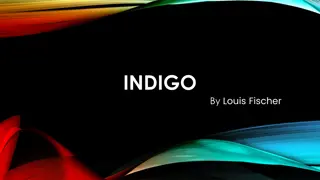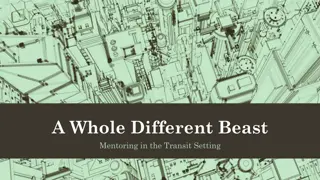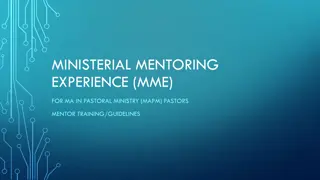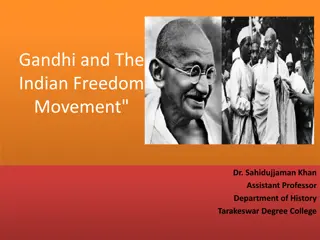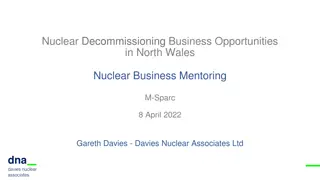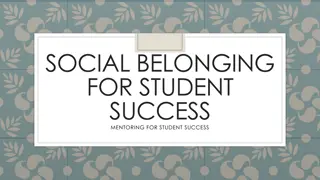
Mentoring in Global Health Research
Explore the definitions and components of mentoring in global health research, as discussed by Monica Gandhi. Learn about the role of a mentor, the differences from other academic relationships, the scope of mentoring, and the various content areas covered in mentoring relationships.
Download Presentation

Please find below an Image/Link to download the presentation.
The content on the website is provided AS IS for your information and personal use only. It may not be sold, licensed, or shared on other websites without obtaining consent from the author. If you encounter any issues during the download, it is possible that the publisher has removed the file from their server.
You are allowed to download the files provided on this website for personal or commercial use, subject to the condition that they are used lawfully. All files are the property of their respective owners.
The content on the website is provided AS IS for your information and personal use only. It may not be sold, licensed, or shared on other websites without obtaining consent from the author.
E N D
Presentation Transcript
http://escholarship.ucop.edu/brand/ucghi/ucghi-logo-white-background.pnghttp://escholarship.ucop.edu/brand/ucghi/ucghi-logo-white-background.png Mentoring the Mentors in Global Health Research Workshop, June 17-18, 2013 Mombasa, Kenya DEFINITIONS OF MENTORING AND COMPONENTS TO A MENTORING TEAM Monica Gandhi MD, MPH Professor of Medicine, HIV/AIDS Division University of California, San Francisco Mombasa, Kenya; June 17, 2013
What is a Mentor? CONSULTANT COACH MANAGER ADVISOR COUNSELOR TEACHER ROLE MODEL GUIDE
What is a mentor? A mentor facilitates personal and professional growth in an individual by sharing the knowledge and insights that have been learned through the years. Teacher share your knowledge and experience Problem solver refer mentees to resources and offer options. Motivator when mentee is facing a challenge (done through encouragement, support, and incentives) Coach help mentee to overcome performance difficulties through positive feedback (reinforce behavior) and constructive feedback (change behavior). Guide help mentee to set realistic goals. Five goal setting factors: specific, time-framed, results oriented, relevant, and reachable. If you don t know where you are going, you won t know how to get there. (DOT Mentoring Handbook, http://www.au.af.mil/au/awc/awcgate/mentor/mentorhb.htm)
How do mentoring relationships differ from other academic relationships? Long-term: Promoting professional development over time Dynamic: Changing as mentee advances Reciprocal: Benefitting both mentor and mentee Active: Shaped by mentee as well (not passive vessel) Voluntary: True mentoring relationship cannot be forced, element of altruism http://todaysfreshmanna.files.wordpress.com/2012/12/mentor.jpg?w=400h=400 Zerzan JT. Academic Medicine 2009
Scope of Mentoring Career Functions Personal Functions Role Modeling Problem Solving/ Counseling Acceptance/ Confirmation Friendship Sponsorship Coaching Protection Challenge Exposure and Visibility Kram, KE. Mentoring at Work: Developmental Relationships in Organizational life. 1988
Content Areas Career goals Clinical skills Conducting research Confidence building CV development Grant writing Negotiating Organization and committee participation Professional networking Promotion/tenure Publishing
Rewards of being a good mentor Achieve satisfaction. For some mentors, their greatest joy is having a mentee succeed and eventually become a friend and colleague. Attract good colleagues. The best mentors are most likely to be able to recruit -and keep - colleagues of high caliber who can help produce better research, papers, grant proposals, and health for the population. Stay on top of your field. There is no better way to keep sharp professionally than to coach junior colleagues. Develop your professional network. In making contacts for your mentee, you strengthen your own contacts and make new ones. Extend your contribution. The results of good mentoring live after you, as new continue to contribute even after you have retired. Handelsman J. Entering Mentoring: A Seminar to train a new generation of scientists. 2009
Components of a mentoring team Research Mentor: Responsible for developing the creative and/or independent research careers of their mentees. Must have expertise in the mentee s area of scholarship and help provide resources to support the mentees work Career Mentor: Responsible for overall career guidance and support for their mentee http://2.bp.blogspot.com/-eExgUZi3eBI/TyXiUSCbZII/AAAAAAAAAGY/gzMxwJooYr0/s1600/Mentee.jpg Co-Mentor: Works with the mentee and scholarly mentor to provide specialized content area or methodological expertise.
Trans and Cis-mentoring: Interdisciplinary http://t0.gstatic.com/images?q=tbn:ANd9GcQ9m-61fWQT45v4p2IXkhVdc3P5p4UQqFKmcApaWFmcZ1idXsyI_w http://t0.gstatic.com/images?q=tbn:ANd9GcQ9m-61fWQT45v4p2IXkhVdc3P5p4UQqFKmcApaWFmcZ1idXsyI_w Trans mentor: Senior mentor outside the major area of the mentee's focus (basic science mentors for mentee whose research emphasizes clinical science.) Cis Mentor: Mentor from the same research discipline Kahn and Greenblatt. Am. J. of Public Health 2009
What works and what doesnt? http://ukhcforums.uky.edu/forums/resized-image.ashx/__size/550x0/__key/CommunityServer.Blogs.Components.WeblogFiles/ukhc_5F00_external_5F00_affairs/coveracademicmedicine-resized.JPG Academic Medicine. January 2013
Characteristics of successful mentoring relationships Characteristic Illustrative quote Reciprocity It s got to be a two-way street. . .mentor also needs some sort of tangible reward from the relationship Mutual respect Both individuals need to respect the qualifications of the other Mutual accountability that the mentor has expectations of the mentee but the mentee also has expectations of the mentor Clear expectations Personal connections Having that connection where you feel like someone actually cares to know what you re thinking and who you are Shared values Mentorship worked when mentors and mentees were on a fairly common ground, have similar ideas and interests and values. Strauss S. Academic Medicine. Jan 2013
Characteristics of failed mentoring relationships Characteristic Illustrative quote Poor communication If you can t talk to them...if you re too intimidated by them to really talk honestly or openly or to really brainstorm about science with them then it s not a good mentoring relationship. Lack of commitment But mentors who.. .get distracted or mentors who have other things that are clearly engaging their mind and not really able to focus...leading towards a failed relationship. Personality differences Perceived (or real) competition Senior people who feel threatened by junior people and they may not even realize that they feel threatened Conflict of interest It failed because of the mentor s lack of knowledge base to be able to provide advice. Lack of experience Strauss S. Academic Medicine. Jan 2013
Tools of mentoring can be taught (like parenting) Individual development plan Meet with your mentees every 2-3 weeks, weekly if needed (UCSF model) Review their CV and have them fill out the individual development plan yearly Components of IDP: 1) Time Allocation as Estimated by Mentee: ___ % Teaching/Training/Providing Mentoring ___ % Research ___ % Patient Care ___ % Administration/Other Services How (if at all) would you like to change this time distribution?
IDP -continued 2) Academic Appointment Do you understand the series to which you are appointed and the expectations for advancement in this series? 3) Current Professional Responsibilities List your major professional responsibilities and if you anticipate significant changes in the coming year: 4) Future Professional Goals Short Term Goals List your professional goals for the coming year. Be as specific as possible, and indicate how you will assess if the goal was accomplished (expected outcome). 1. Goal Expected outcome: 2. Goal Expected outcome: 3. Goal Expected outcome:
IDP -continued 5) Future Professional Goals Long Term Goals List your professional goals for the next 3-5 years. Again, be specific, and indicate how you will assess if the goal was accomplished. 1. Goal Expected outcome: 2. Goal Expected outcome: 3. Goal Expected outcome:
Questions? http://todaysfreshmanna.files.wordpress.com/2012/12/mentor.jpg?w=400h=400

